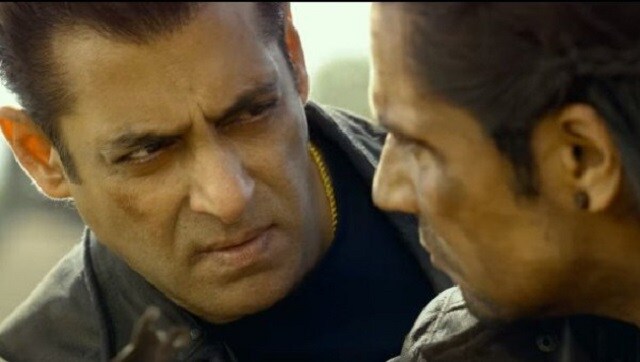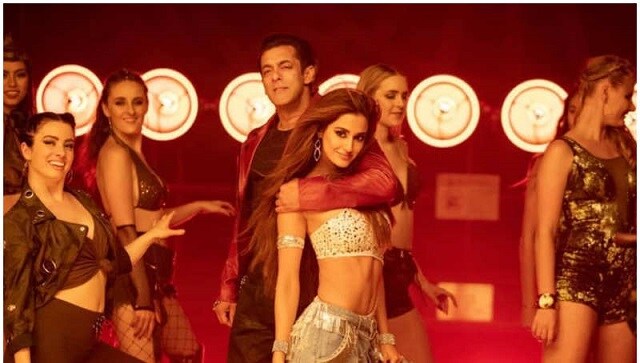With muted reception to event films on OTT platforms, release of Salman Khan's Radhe is a high-profile litmus test
The argument can be made that event films like Laxmii and Coolie No. 1 were never meant to belong in homes and laptop screens. But the counterargument is that perhaps they were never meant to belong at all.

Salman Khan in Radhe: Your Most Wanted Bhai
On a lukewarm Republic Day weekend in 2014, I made my way to a popular suburban multiplex. I was nervous. It was my first morning as a professional film critic. After a few years of free-stringing for a website, I had landed the coveted Bollywood-reviewing gig for a noted Mumbai newspaper. Consequently, I spent the full week leading up to Friday obsessing about how I would “construct” my first print review. What if they fired me for being too young and brash? What if my words made no sense? What if readers sent in hate mail – or worse, pointed out typos?
But the moment the lights dimmed, my nerves dissipated. Ironically, the movie itself had nothing to do with it. The screen did. Salman Khan’s latest group-therapy project, Jai Ho, was not watched so much as commemorated. The otherwise-dignified theatre had morphed into a raucous stadium of whistles and hoots. The atmosphere put me at ease. Clearly, the review was not going to matter. I could write it in Sanskrit, and readers would be none the wiser. I relaxed, sat back, and observed the faces around me. It feels strange to confess after all these years that, in some twisted way, it was perhaps Salman Khan who unwittingly eased me into a career of art criticism.
The concert experience was reflected in the gimmicky form I chose for the review – a satire of those sports listicles that describe a game in numbers. (3: Number of times an excitable Bhai fan’s elbow hit my face during the hero-entry shot). Why bother with something sensible? This was no art anyway. It was a commercial constitution of, by, and for the people. Such movies were critic-proof because they were not really movies to begin with. When an emperor appeases his commoners, the medium of vision is incidental – the screen separating us from him may as well have been a bulky border of bodyguards.
Over the last 14 months, however, I have often found my mind wandering back to that Friday. Not quite in a nostalgic sense. The COVID-19 pandemic has crippled this country more than most. It has also changed the way we live. We eat and exercise differently. We sleep differently. We work differently. We emote differently. We survive differently. We think differently. And by extension, we are entertained differently. Repetitive lockdowns have affected the exhibition of commercial Hindi cinema, and in turn, changed the way we watch movies. We confront stories differently. The small screen of the OTT platform has replaced the big screen of the cinema hall. But the change is more cultural than cosmetic. The human mind is a funny thing. Just as looks are defined by faces, outlooks are determined by spaces.
pandemic has crippled this country more than most. It has also changed the way we live. We eat and exercise differently. We sleep differently. We work differently. We emote differently. We survive differently. We think differently. And by extension, we are entertained differently. Repetitive lockdowns have affected the exhibition of commercial Hindi cinema, and in turn, changed the way we watch movies. We confront stories differently. The small screen of the OTT platform has replaced the big screen of the cinema hall. But the change is more cultural than cosmetic. The human mind is a funny thing. Just as looks are defined by faces, outlooks are determined by spaces.
Late last year, the Akshay Kumar-starrer Laxmii secured a Disney+ Hotstar Multiplex release. The anticipation had an edge to it. It was the first legitimate superstar vehicle to directly test the streaming waters. All signs pointed to a successful experiment: People needed a mental break from the bleakness of the outside world, and crude mainstream movies are nothing if not garish escapes. But the bitter reception Laxmii got – not just from critics but also the cherished masses – burst the traditional bubble. It suggested a superhero crashing without his bullet-proof cape. The ‘audience reviews,’ too, were brutal. Even the trade analysts were scathing. Laxmii was admittedly awful, but the parameters of quality had never quite applied to India’s big-budget superstar vehicles. Yet here was one that came unprotected by the statistical trappings of a box office. One could sense that the OTT landscape had, for better or worse, levelled the playing field. The prism people adopted to watch a Raat Akeli Hai was also the one being used to consume a Laxmii. It was no more chalk and cheese. Laxmii, a crass product, found itself in a museum instead of a mall.
Given that cinema had ceased to be a community experience, the unanimous panning of Laxmii also revealed that people had begun to expect more than a weekend outing. The escape was always more physical than psychological – movies were tailored to fit the theatrical experience instead of vice-versa. Without the prestige value of the theatre, the result resembled an empty emotional scene sans the crying violins. Earlier, the term ‘content’ was simply used to describe the opposite of massy commercial fare. But now, everything – including skits, shows, and arthouse offerings – jostled for space under one leaky umbrella of Content. As a result, the perception of a “hit” has been altered too. Think 2020, and names like Paatal Lok, Scam 1992, Panchayat, Bulbbul, and Ludo come to mind. The obviously mainstream and proudly brain-dead fare like Khaali Peeli, Sadak 2, and eventually even Coolie No. 1 suffered from the kind of identity crisis that the Gulabo Sitabos and Serious Mens of the year might have suffered on the big screen. This was not their kingdom.
The argument can be made that they were never meant to belong in homes and laptop screens. But the counterargument is that perhaps they were never meant to belong at all.
Without the security blanket of commercial immunity, all that remained were vacant voices urging people at home to leave their brains at home.
When cinemas in Mumbai and Delhi briefly opened their doors before the devastating second wave, starry mainstream titles like Mumbai Saga and Saina failed to convince wary citizens – as opposed to audiences – that they were worth a tricky trip to the hall. Despite hitting streaming platforms during lockdown, neither could escape the artistic scrutiny of failing ticket-buying viewers during their theatrical run. The same ‘junta’ that might have eagerly lapped them up as masala entertainment in an ordinary world were now reacting pragmatically to the uninsured mediocrity of these productions. Even Roohi, a Stree-style horror comedy marketed as Bollywood’s “magic of big screen” return in March, soon found itself being cringe-watched on Netflix despite a modest new-normal box-office haul. The negative buzz translates into eyeballs and trending lists, no doubt, but it does not account for the shifting mindset of a restless population whose movie-going is no more a palpable social action.
The stop-start functioning of Indian society looks set for the long haul, with a third wave expected after this one subsides. Which means that even the untouchable big-screen epics like Sooryavanshi and 83 – whose theatrical runs have been indefinitely postponed in pursuit of traditional revenue models – might be forced to consider an OTT premiere instead. Leaving aside the large-scale pre-pandemic productions that were already on the floor or completed in early 2020, it is difficult to imagine big banners greenlighting a Rs 200-crore vanity project without the financial amplification of the multiplex system.
The more utopian of us might even assume that it is taken nothing less than a global pandemic to end the studio-system monopoly over a parched film-loving culture.
Poetically, it is a Salman Khan actioner on Eid that is primed to fan the fading flames of heritage. In its hands is the fate of not just a few impending releases but also the definition of Bollywood as we know it. It is a high-profile litmus test. To draw a sporting analogy: India needs 16 runs off the final over, with an ageing MS Dhoni at the crease. Radhe: Your Most Wanted Bhai is expected to pave the way for fragile co-existence – it will have a multi-format release on 13 May, slated to show simultaneously in (available) theatres, premium-video-on-demand on ZeePlex, and Direct-To-Home services like Tata Sky. The strategy mirrors the recent Warner Bros decision of debuting their entire 2021 slate on HBO Max and in theatres at once. The Bollywood enthusiast’s idea of an event may not be Radhe right now, but that is not to say Radhe is not designed as an event. Not surprisingly, both Radhe and Laxmii were initially slated to lock horns on Eid 2020. A year later, only one of them is left standing, looking to rescue the long-standing relationship of mainstream Hindi cinema with tentpole legacy. It does not depend on Dhoni anymore, it depends on the bowler. The question being: Is Radhe Your Most Wanted Bhai anymore?
But I do know that when the lights dim in my room on a hot summer day, the nerves will not dissipate. The pressure will be on. The critic need not resort to narrative gimmickry to imitate the material at hand. Because the material itself – long fetishised as a philanthropic symbol of everyman escapism – has no escape. The spell of reception is no more the currency of redemption. There is no big screen, there is no atmosphere, there is no celebration to have. There is only a moving picture standing in front of a solitary viewer asking him to worship it.
also read

Salman Khan praises Allu Arjun's performance in original song 'Seeti Maar', Telugu actor responds
Radhe actors SalmanKhan and Disha Patani feature in the Hindi version of Allu Arjun's song 'Seeti Maar.'

Watch: Title track of Salman Khan’s new film Radhe: Your Most Wanted Bhai released
The song has been composed by Sajid-Wajid.

Arpita Khan clarifies she's fully recovered after Salman Khan said she'd tested positive for coronavirus
Arpita Khan Sharma said she had contracted the coronavirus at the beginning of April, but had followed all safety protocols and is fine now
